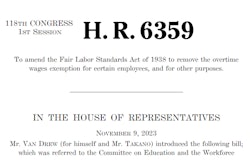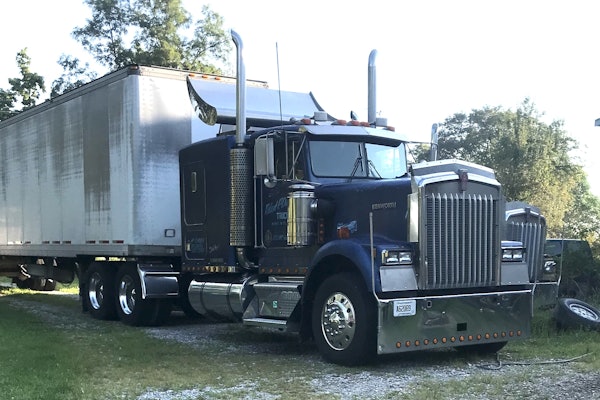Trucking news and briefs for Thursday, Dec. 21, 2023:
OOIDA calls on FMCSA to strengthen broker financial responsibility rule
The Federal Motor Carrier Safety Administration in November issued a final rule that, among other things, will allow the agency to shut a broker or freight forwarder down quickly in the event of a drawdown on a bond or other required financial security with valid claims, or for other reasons.
The Owner-Operator Independent Drivers Association said it’s generally supportive of the rule, noting that it’s an improvement over the notice of proposed rulemaking that preceded the final rule in January 2023.
However, OOIDA said in a petition for reconsideration that the rulemaking “can be supplemented to further alleviate the concern of broker nonpayment of claims.” The group added that “various modifications can improve the economic health of the broker/motor carrier component of the transportation industry. Additionally, small-business motor carriers who rely upon brokers will be spared financial loss from both brokers and ineffective bonds or trusts under these suggested amendments.”
Among changes to the final rule OOIDA is requesting:
- Clarification of two provisions related to the suspension of broker/freight forwarder operating authority. OOIDA recommends that FMCSA “stipulate a 7-day period for the surety provider or financial institution to investigate and determine the validity of the claim” to “ensure a timely claims process as intended by the Final Rule and offset attempts at prolonging payments to motor carriers.” The group also asks the agency to provide more details about how the industry will be able to know when a broker’s financial responsibility falls below $75,000.
- Posting notices of financial failure or insolvency on FMCSA’s SAFER page for the broker/freight forwarder, rather than the FMCSA Register as stated in the final rule. OOIDA said the FMCSA Register “is not an ideal location to publish any notice of financial failure or insolvency” because its “documents are not searchable or intuitively accessible.”
- Annual report on fraud combat. FMCSA should publish an annual report, OOIDA said, detailing its efforts to combat broker fraud.
“OOIDA supports FMCSA finalizing the Broker and Freight Forwarder Financial Responsibility rule, but believes the agency can further address problems with the broker bond claims process,” the group concluded. “The final rule should be enhanced to ensure transparency when a broker/freight forwarder’s financial responsibility falls below $75,000. The agency should also stipulate a 7-day period for the surety provider or financial institution to investigate and determine the validity of the claim. These and other modifications will promote a fair working environment between brokers/freight forwarders and motor carriers that will best serve the public interest.”

[Related: FMCSA tightens screws on brokers who 'do not intend to pay' carriers: Final rule]
Georgia Ports establishes committee to improve trucker safety
Georgia Ports announced this month it has established a Trucker Safety Committee to address driver concerns and help new and existing drivers become more familiar with safe operations at port terminals.
“GPA values its partners in the motor carrier industry and respects the job that they do every day,” said GPA President and CEO Griff Lynch. “Georgia Ports created this initiative to increase communication between our port operations and safety teams and motor carriers.”
More than 13,200 motor carriers are registered as active users of the Port of Savannah, GPA said. Direct communication with the trucking community can be challenging because of the wide range of operators, including owner-operators representing one driver and large companies that represent dozens or even hundreds of drivers.
The Trucker Safety Committee aims to bring representatives from all groups to the table to listen to the communities’ needs and respond in actionable ways. The committee is made up of terminal managers and dispatchers from large and midsized companies, with a rotation system to include voices from smaller companies.
[Related: New truck stop and CNG-power push coming near Port of Savannah]
The Port of Savannah’s Garden City Terminal averages more than 6,000 truck visits per day. The average time a driver is on terminal for a single move, either dropping off a container or picking up a container, is just under 35 minutes. A double move -- dropping off a container and picking up a different container -- is only 54 minutes at Garden City Terminal, the fastest of any gateway port, GPA noted.
A recent committee meeting included nearly 30 drivers representing 15 motor carrier companies of all sizes.
Representatives from GPA operations teams shared information about gate operations, trouble-ticket processes, and procedures for the empty container yard. After hearing from Georgia Ports, the group discussed concerns about issues they have been facing.
Resources for motor carriers, including a Garden City Terminal Drivers’ Orientation video, can be found here.
[Related: E-truck charging depot planned for Port of Long Beach]
Iowa harvest proclamation extended again
Iowa Gov. Kim Reynolds has once again extended a harvest proclamation in the state, which allows certain agriculture haulers to exceed 80,000 pounds gross.
The proclamation is now effective through Jan. 11. It was first issued Sept. 11 and has been extended in one-month increments since.
It allows vehicles transporting corn, soybeans, hay, straw, silage, stover, fertilizer (dry, liquid and gas), and manure (dry and liquid) to be overweight (not exceeding 90,000 pounds gross weight) without a permit for the duration of the waiver.
This waiver applies to loads transported on all highways within Iowa (excluding the interstate system) and those that don't exceed a maximum of 90,000 pounds gross weight. Other stipulations that must be met to take advantage of the exemption:
- The load cannot exceed the maximum axle weight limit determined under the non-primary highway maximum gross weight table in Iowa Code § 321.463 (6) (a) and (b) by more than 12.5%
- The load cannot exceed the legal maximum axle weight limit of 20,000 pounds
- Drivers must comply with posted weight limits on roads and bridges
[Related: Shorter automatic emergency HOS exemptions: FMCSA petitioned to reconsider]









